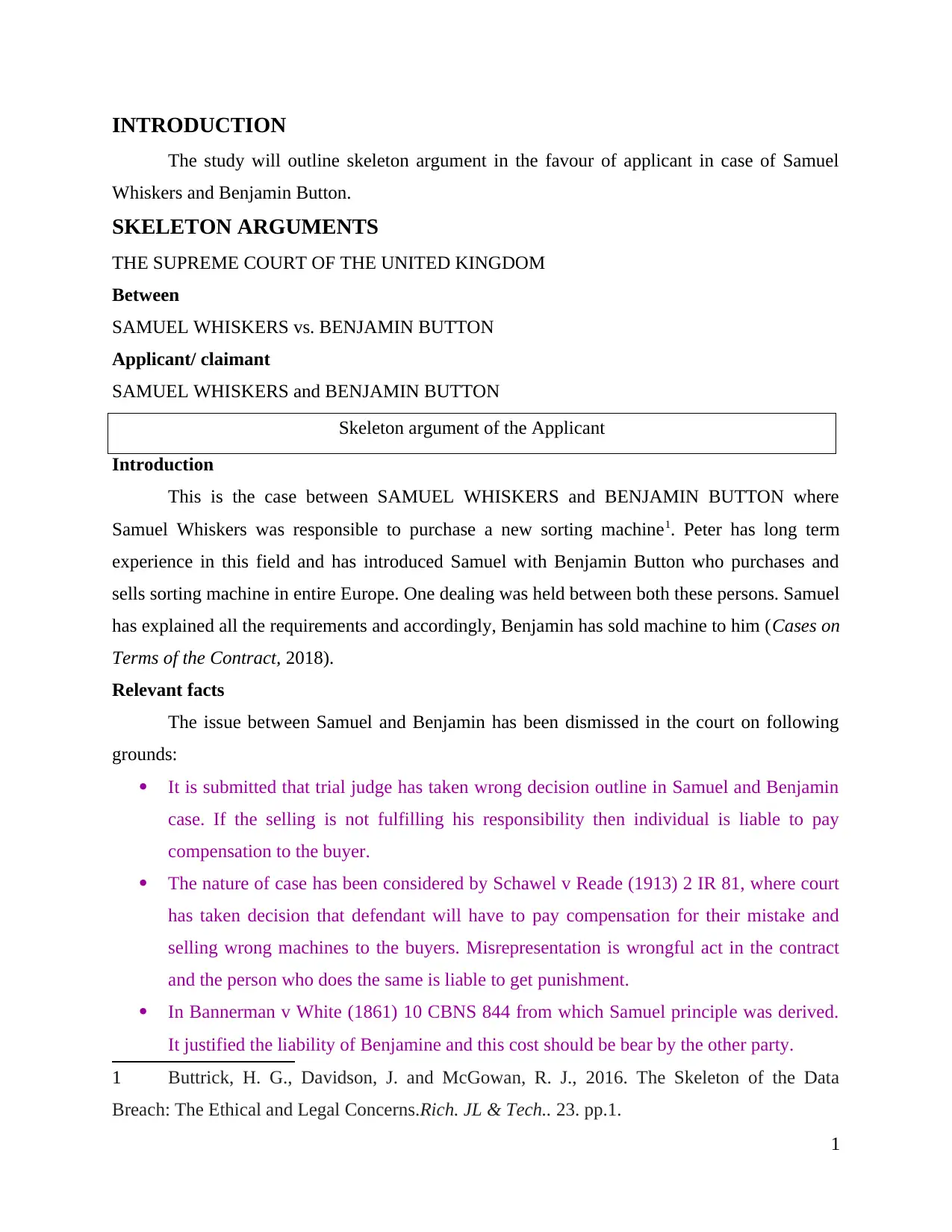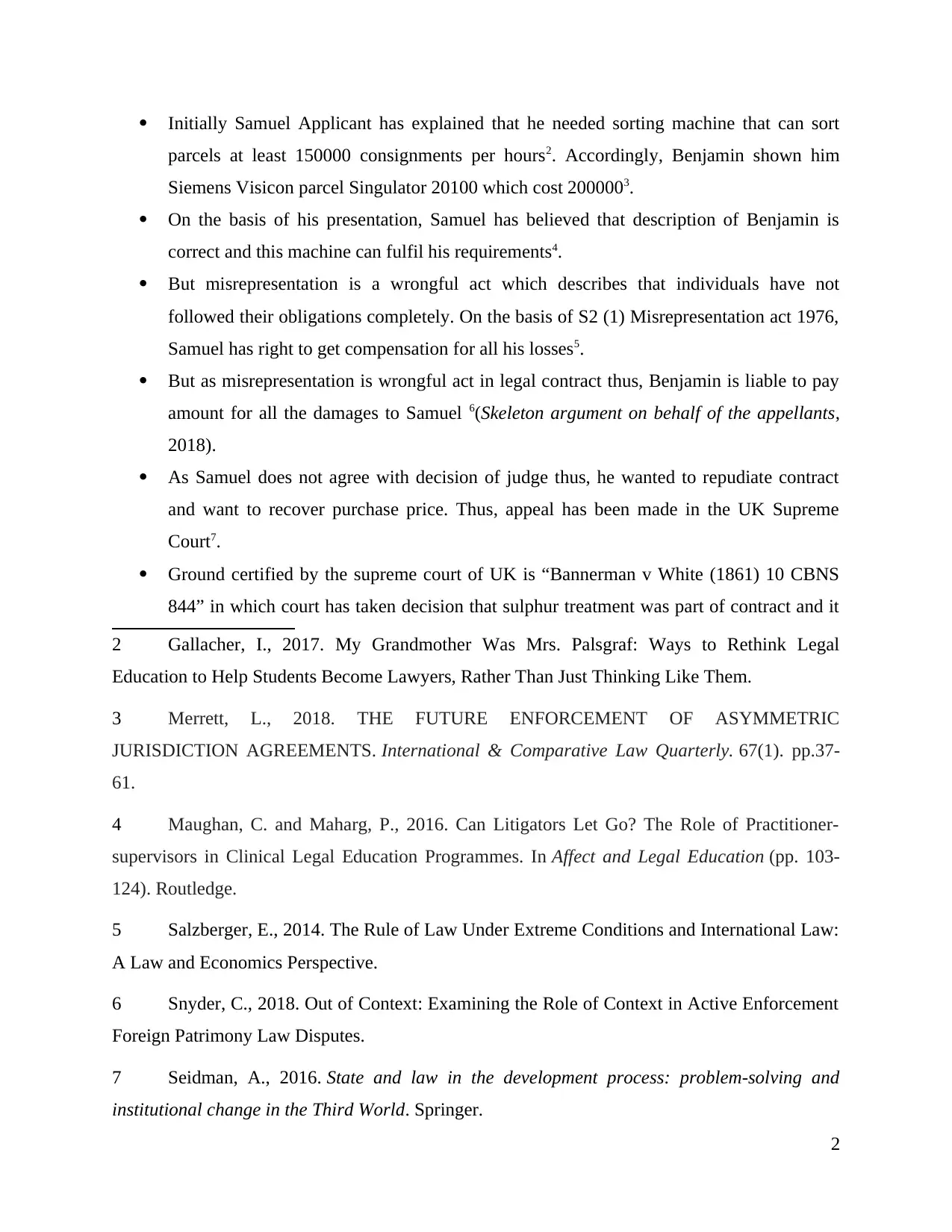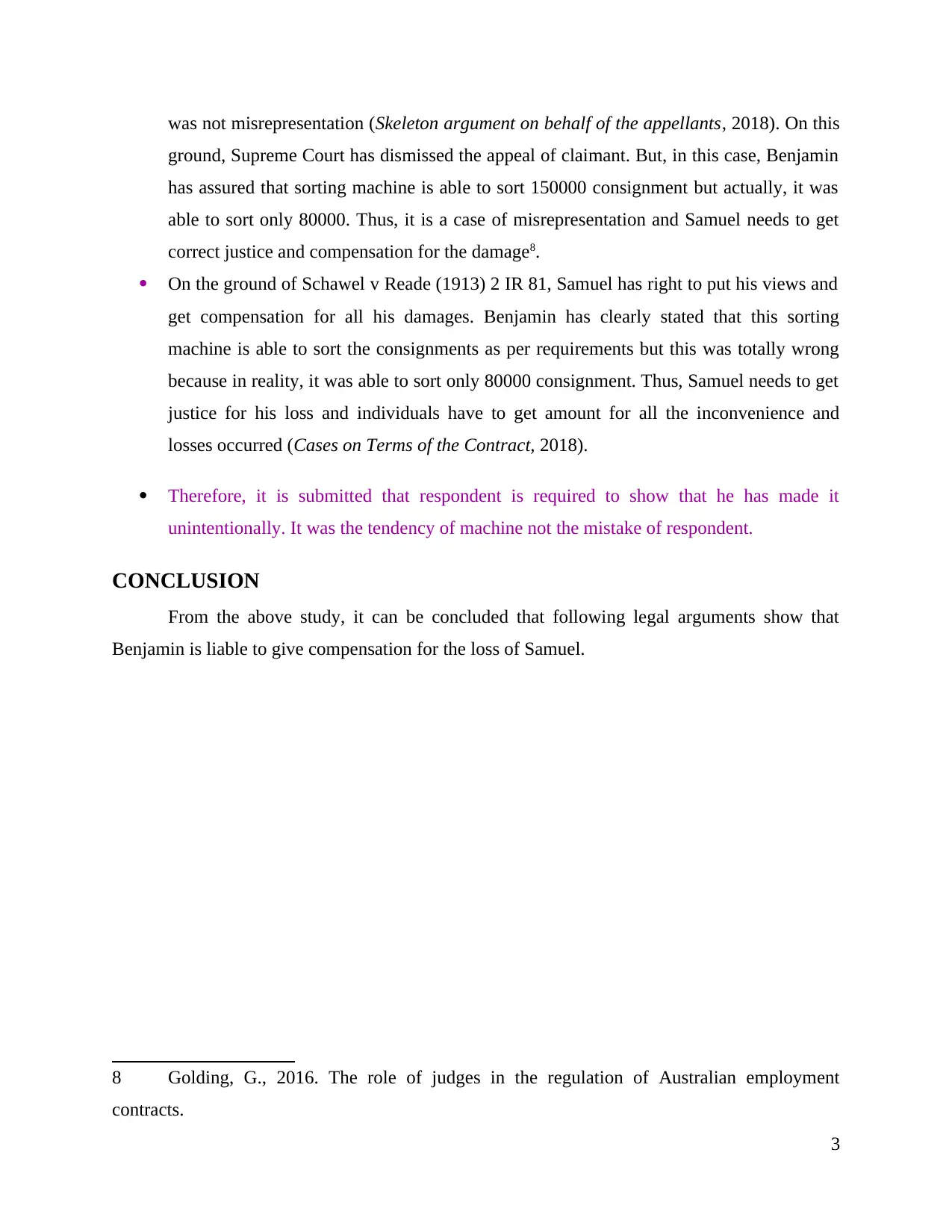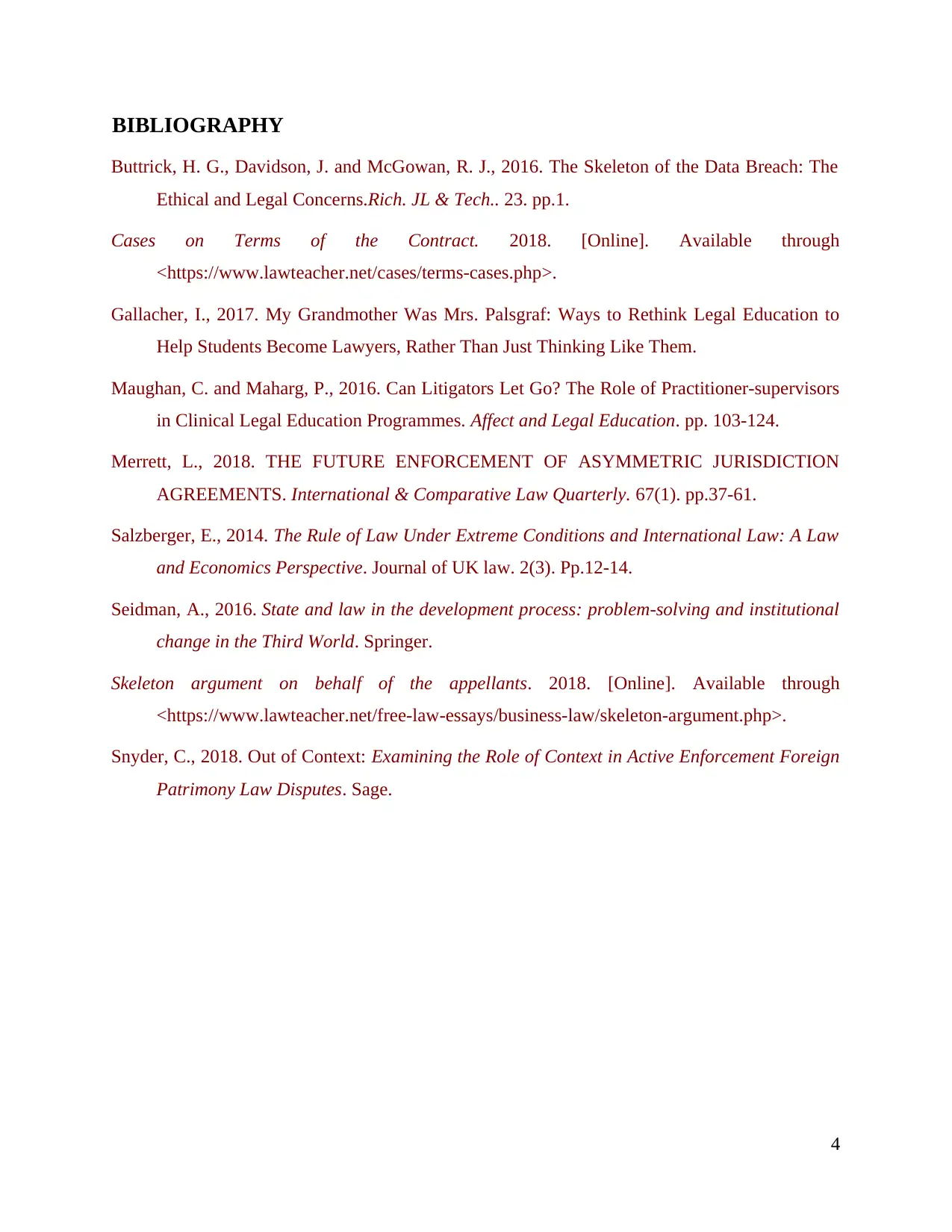Legal Analysis: Samuel Whiskers vs. Benjamin Button Contract Law
VerifiedAdded on 2020/06/04
|6
|1281
|117
Report
AI Summary
This report analyzes the contract law case of Samuel Whiskers vs. Benjamin Button, focusing on a dispute over a sorting machine. The case involves misrepresentation, as the machine sold by Benjamin Button did not meet Samuel Whiskers' requirements. The report presents the skeleton arguments, highlighting the key facts, relevant legal precedents like Schawel v Reade and Bannerman v White, and the application of the Misrepresentation Act 1976. It argues that Benjamin Button is liable for the damages incurred by Samuel Whiskers due to the machine's underperformance. The report concludes that Benjamin Button should compensate Samuel Whiskers for the losses, based on the misrepresentation of the machine's capabilities. The analysis emphasizes the importance of accurate representations in contracts and the consequences of failing to meet contractual obligations. The report refers to legal cases and academic resources to support its claims and provide a comprehensive understanding of the legal issues involved.

CONTRACT LAW
Paraphrase This Document
Need a fresh take? Get an instant paraphrase of this document with our AI Paraphraser

TABLE OF CONTENTS
INTRODUCTION...........................................................................................................................1
SKELETON ARGUMENTS ..........................................................................................................1
CONCLUSION................................................................................................................................3
BIBLIOGRAPHY............................................................................................................................4
INTRODUCTION...........................................................................................................................1
SKELETON ARGUMENTS ..........................................................................................................1
CONCLUSION................................................................................................................................3
BIBLIOGRAPHY............................................................................................................................4

INTRODUCTION
The study will outline skeleton argument in the favour of applicant in case of Samuel
Whiskers and Benjamin Button.
SKELETON ARGUMENTS
THE SUPREME COURT OF THE UNITED KINGDOM
Between
SAMUEL WHISKERS vs. BENJAMIN BUTTON
Applicant/ claimant
SAMUEL WHISKERS and BENJAMIN BUTTON
Skeleton argument of the Applicant
Introduction
This is the case between SAMUEL WHISKERS and BENJAMIN BUTTON where
Samuel Whiskers was responsible to purchase a new sorting machine1. Peter has long term
experience in this field and has introduced Samuel with Benjamin Button who purchases and
sells sorting machine in entire Europe. One dealing was held between both these persons. Samuel
has explained all the requirements and accordingly, Benjamin has sold machine to him (Cases on
Terms of the Contract, 2018).
Relevant facts
The issue between Samuel and Benjamin has been dismissed in the court on following
grounds:
It is submitted that trial judge has taken wrong decision outline in Samuel and Benjamin
case. If the selling is not fulfilling his responsibility then individual is liable to pay
compensation to the buyer.
The nature of case has been considered by Schawel v Reade (1913) 2 IR 81, where court
has taken decision that defendant will have to pay compensation for their mistake and
selling wrong machines to the buyers. Misrepresentation is wrongful act in the contract
and the person who does the same is liable to get punishment.
In Bannerman v White (1861) 10 CBNS 844 from which Samuel principle was derived.
It justified the liability of Benjamine and this cost should be bear by the other party.
1 Buttrick, H. G., Davidson, J. and McGowan, R. J., 2016. The Skeleton of the Data
Breach: The Ethical and Legal Concerns.Rich. JL & Tech.. 23. pp.1.
1
The study will outline skeleton argument in the favour of applicant in case of Samuel
Whiskers and Benjamin Button.
SKELETON ARGUMENTS
THE SUPREME COURT OF THE UNITED KINGDOM
Between
SAMUEL WHISKERS vs. BENJAMIN BUTTON
Applicant/ claimant
SAMUEL WHISKERS and BENJAMIN BUTTON
Skeleton argument of the Applicant
Introduction
This is the case between SAMUEL WHISKERS and BENJAMIN BUTTON where
Samuel Whiskers was responsible to purchase a new sorting machine1. Peter has long term
experience in this field and has introduced Samuel with Benjamin Button who purchases and
sells sorting machine in entire Europe. One dealing was held between both these persons. Samuel
has explained all the requirements and accordingly, Benjamin has sold machine to him (Cases on
Terms of the Contract, 2018).
Relevant facts
The issue between Samuel and Benjamin has been dismissed in the court on following
grounds:
It is submitted that trial judge has taken wrong decision outline in Samuel and Benjamin
case. If the selling is not fulfilling his responsibility then individual is liable to pay
compensation to the buyer.
The nature of case has been considered by Schawel v Reade (1913) 2 IR 81, where court
has taken decision that defendant will have to pay compensation for their mistake and
selling wrong machines to the buyers. Misrepresentation is wrongful act in the contract
and the person who does the same is liable to get punishment.
In Bannerman v White (1861) 10 CBNS 844 from which Samuel principle was derived.
It justified the liability of Benjamine and this cost should be bear by the other party.
1 Buttrick, H. G., Davidson, J. and McGowan, R. J., 2016. The Skeleton of the Data
Breach: The Ethical and Legal Concerns.Rich. JL & Tech.. 23. pp.1.
1
⊘ This is a preview!⊘
Do you want full access?
Subscribe today to unlock all pages.

Trusted by 1+ million students worldwide

Initially Samuel Applicant has explained that he needed sorting machine that can sort
parcels at least 150000 consignments per hours2. Accordingly, Benjamin shown him
Siemens Visicon parcel Singulator 20100 which cost 2000003.
On the basis of his presentation, Samuel has believed that description of Benjamin is
correct and this machine can fulfil his requirements4.
But misrepresentation is a wrongful act which describes that individuals have not
followed their obligations completely. On the basis of S2 (1) Misrepresentation act 1976,
Samuel has right to get compensation for all his losses5.
But as misrepresentation is wrongful act in legal contract thus, Benjamin is liable to pay
amount for all the damages to Samuel 6(Skeleton argument on behalf of the appellants,
2018).
As Samuel does not agree with decision of judge thus, he wanted to repudiate contract
and want to recover purchase price. Thus, appeal has been made in the UK Supreme
Court7.
Ground certified by the supreme court of UK is “Bannerman v White (1861) 10 CBNS
844” in which court has taken decision that sulphur treatment was part of contract and it
2 Gallacher, I., 2017. My Grandmother Was Mrs. Palsgraf: Ways to Rethink Legal
Education to Help Students Become Lawyers, Rather Than Just Thinking Like Them.
3 Merrett, L., 2018. THE FUTURE ENFORCEMENT OF ASYMMETRIC
JURISDICTION AGREEMENTS. International & Comparative Law Quarterly. 67(1). pp.37-
61.
4 Maughan, C. and Maharg, P., 2016. Can Litigators Let Go? The Role of Practitioner-
supervisors in Clinical Legal Education Programmes. In Affect and Legal Education (pp. 103-
124). Routledge.
5 Salzberger, E., 2014. The Rule of Law Under Extreme Conditions and International Law:
A Law and Economics Perspective.
6 Snyder, C., 2018. Out of Context: Examining the Role of Context in Active Enforcement
Foreign Patrimony Law Disputes.
7 Seidman, A., 2016. State and law in the development process: problem-solving and
institutional change in the Third World. Springer.
2
parcels at least 150000 consignments per hours2. Accordingly, Benjamin shown him
Siemens Visicon parcel Singulator 20100 which cost 2000003.
On the basis of his presentation, Samuel has believed that description of Benjamin is
correct and this machine can fulfil his requirements4.
But misrepresentation is a wrongful act which describes that individuals have not
followed their obligations completely. On the basis of S2 (1) Misrepresentation act 1976,
Samuel has right to get compensation for all his losses5.
But as misrepresentation is wrongful act in legal contract thus, Benjamin is liable to pay
amount for all the damages to Samuel 6(Skeleton argument on behalf of the appellants,
2018).
As Samuel does not agree with decision of judge thus, he wanted to repudiate contract
and want to recover purchase price. Thus, appeal has been made in the UK Supreme
Court7.
Ground certified by the supreme court of UK is “Bannerman v White (1861) 10 CBNS
844” in which court has taken decision that sulphur treatment was part of contract and it
2 Gallacher, I., 2017. My Grandmother Was Mrs. Palsgraf: Ways to Rethink Legal
Education to Help Students Become Lawyers, Rather Than Just Thinking Like Them.
3 Merrett, L., 2018. THE FUTURE ENFORCEMENT OF ASYMMETRIC
JURISDICTION AGREEMENTS. International & Comparative Law Quarterly. 67(1). pp.37-
61.
4 Maughan, C. and Maharg, P., 2016. Can Litigators Let Go? The Role of Practitioner-
supervisors in Clinical Legal Education Programmes. In Affect and Legal Education (pp. 103-
124). Routledge.
5 Salzberger, E., 2014. The Rule of Law Under Extreme Conditions and International Law:
A Law and Economics Perspective.
6 Snyder, C., 2018. Out of Context: Examining the Role of Context in Active Enforcement
Foreign Patrimony Law Disputes.
7 Seidman, A., 2016. State and law in the development process: problem-solving and
institutional change in the Third World. Springer.
2
Paraphrase This Document
Need a fresh take? Get an instant paraphrase of this document with our AI Paraphraser

was not misrepresentation (Skeleton argument on behalf of the appellants, 2018). On this
ground, Supreme Court has dismissed the appeal of claimant. But, in this case, Benjamin
has assured that sorting machine is able to sort 150000 consignment but actually, it was
able to sort only 80000. Thus, it is a case of misrepresentation and Samuel needs to get
correct justice and compensation for the damage8.
On the ground of Schawel v Reade (1913) 2 IR 81, Samuel has right to put his views and
get compensation for all his damages. Benjamin has clearly stated that this sorting
machine is able to sort the consignments as per requirements but this was totally wrong
because in reality, it was able to sort only 80000 consignment. Thus, Samuel needs to get
justice for his loss and individuals have to get amount for all the inconvenience and
losses occurred (Cases on Terms of the Contract, 2018).
Therefore, it is submitted that respondent is required to show that he has made it
unintentionally. It was the tendency of machine not the mistake of respondent.
CONCLUSION
From the above study, it can be concluded that following legal arguments show that
Benjamin is liable to give compensation for the loss of Samuel.
8 Golding, G., 2016. The role of judges in the regulation of Australian employment
contracts.
3
ground, Supreme Court has dismissed the appeal of claimant. But, in this case, Benjamin
has assured that sorting machine is able to sort 150000 consignment but actually, it was
able to sort only 80000. Thus, it is a case of misrepresentation and Samuel needs to get
correct justice and compensation for the damage8.
On the ground of Schawel v Reade (1913) 2 IR 81, Samuel has right to put his views and
get compensation for all his damages. Benjamin has clearly stated that this sorting
machine is able to sort the consignments as per requirements but this was totally wrong
because in reality, it was able to sort only 80000 consignment. Thus, Samuel needs to get
justice for his loss and individuals have to get amount for all the inconvenience and
losses occurred (Cases on Terms of the Contract, 2018).
Therefore, it is submitted that respondent is required to show that he has made it
unintentionally. It was the tendency of machine not the mistake of respondent.
CONCLUSION
From the above study, it can be concluded that following legal arguments show that
Benjamin is liable to give compensation for the loss of Samuel.
8 Golding, G., 2016. The role of judges in the regulation of Australian employment
contracts.
3

BIBLIOGRAPHY
Buttrick, H. G., Davidson, J. and McGowan, R. J., 2016. The Skeleton of the Data Breach: The
Ethical and Legal Concerns.Rich. JL & Tech.. 23. pp.1.
Cases on Terms of the Contract. 2018. [Online]. Available through
<https://www.lawteacher.net/cases/terms-cases.php>.
Gallacher, I., 2017. My Grandmother Was Mrs. Palsgraf: Ways to Rethink Legal Education to
Help Students Become Lawyers, Rather Than Just Thinking Like Them.
Maughan, C. and Maharg, P., 2016. Can Litigators Let Go? The Role of Practitioner-supervisors
in Clinical Legal Education Programmes. Affect and Legal Education. pp. 103-124.
Merrett, L., 2018. THE FUTURE ENFORCEMENT OF ASYMMETRIC JURISDICTION
AGREEMENTS. International & Comparative Law Quarterly. 67(1). pp.37-61.
Salzberger, E., 2014. The Rule of Law Under Extreme Conditions and International Law: A Law
and Economics Perspective. Journal of UK law. 2(3). Pp.12-14.
Seidman, A., 2016. State and law in the development process: problem-solving and institutional
change in the Third World. Springer.
Skeleton argument on behalf of the appellants. 2018. [Online]. Available through
<https://www.lawteacher.net/free-law-essays/business-law/skeleton-argument.php>.
Snyder, C., 2018. Out of Context: Examining the Role of Context in Active Enforcement Foreign
Patrimony Law Disputes. Sage.
4
Buttrick, H. G., Davidson, J. and McGowan, R. J., 2016. The Skeleton of the Data Breach: The
Ethical and Legal Concerns.Rich. JL & Tech.. 23. pp.1.
Cases on Terms of the Contract. 2018. [Online]. Available through
<https://www.lawteacher.net/cases/terms-cases.php>.
Gallacher, I., 2017. My Grandmother Was Mrs. Palsgraf: Ways to Rethink Legal Education to
Help Students Become Lawyers, Rather Than Just Thinking Like Them.
Maughan, C. and Maharg, P., 2016. Can Litigators Let Go? The Role of Practitioner-supervisors
in Clinical Legal Education Programmes. Affect and Legal Education. pp. 103-124.
Merrett, L., 2018. THE FUTURE ENFORCEMENT OF ASYMMETRIC JURISDICTION
AGREEMENTS. International & Comparative Law Quarterly. 67(1). pp.37-61.
Salzberger, E., 2014. The Rule of Law Under Extreme Conditions and International Law: A Law
and Economics Perspective. Journal of UK law. 2(3). Pp.12-14.
Seidman, A., 2016. State and law in the development process: problem-solving and institutional
change in the Third World. Springer.
Skeleton argument on behalf of the appellants. 2018. [Online]. Available through
<https://www.lawteacher.net/free-law-essays/business-law/skeleton-argument.php>.
Snyder, C., 2018. Out of Context: Examining the Role of Context in Active Enforcement Foreign
Patrimony Law Disputes. Sage.
4
⊘ This is a preview!⊘
Do you want full access?
Subscribe today to unlock all pages.

Trusted by 1+ million students worldwide
1 out of 6
Your All-in-One AI-Powered Toolkit for Academic Success.
+13062052269
info@desklib.com
Available 24*7 on WhatsApp / Email
![[object Object]](/_next/static/media/star-bottom.7253800d.svg)
Unlock your academic potential
Copyright © 2020–2026 A2Z Services. All Rights Reserved. Developed and managed by ZUCOL.